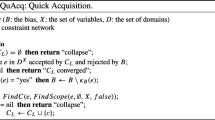Abstract
Constraint programming is rapidly becoming the technology of choice for modeling and solving complex combinatorial problems. However, users of constraint programming technology need significant expertise in order to model their problem appropriately. The lack of availability of such expertise can be a significant bottleneck to the broader uptake of constraint technology in the real world. In this paper we are concerned with automating the formulation of constraint satisfaction problems from examples of solutions and non-solutions. We combine techniques from the fields of machine learning and constraint programming. In particular we present a portfolio of approaches to exploiting the semantics of the constraints that we acquire to improve the efficiency of the acquisition process. We demonstrate how inference and search can be used to extract useful information that would otherwise be hidden in the set of examples from which we learn the target constraint satisfaction problem. We demonstrate the utility of the approaches in a case-study domain.
The collaboration between LIRMM and the Cork Constraint Computation Centre is supported by a Ulysses Travel Grant from Enterprise Ireland, the Royal Irish Academy and CNRS (Grant Number FR/2003/022). This work has also received support from Science Foundation Ireland under Grant 00/PI.1/C075.
Access this chapter
Tax calculation will be finalised at checkout
Purchases are for personal use only
Preview
Unable to display preview. Download preview PDF.
Similar content being viewed by others
References
Choi, C.W., Lee, J.H.M., Stuckey, P.J.: Propagation redundancy in redundant modelling. In: Rossi, F. (ed.) CP 2003. LNCS, vol. 2833, pp. 229–243. Springer, Heidelberg (2003)
Coletta, R., Bessiere, C., O’Sullivan, B., Freuder, E.C., O’Connell, S., Quinqueton, J.: Constraint acquisition as semi-automatic modeling. In: Proceedings of AI 2003, pp. 111–124 (2003)
Dechter, A., Dechter, R.: Removing redundancies in constraint networks. In: Proceedings of AAAI 1987, pp. 105–109 (1987)
Dechter, R., van Beek, P.: Local and global relational consistency. Theoretical Computer Science 173(1), 283–308 (1997)
Mackworth, A.: Consistency in networks of relations. Artificial Intelligence 8, 99–118 (1977)
Mitchell, T.: Generalization as search. Artificial Intelligence 18(2), 203–226 (1982)
Monasson, R., Zecchina, R., Kirkpatrick, S., Selman, B., Ttroyansky, L.: Determining computational complexity from characteristic ’phase transition’. Nature 400, 133–137 (1999)
Page, C.D., Frisch, A.M.: Generalization and learnability: A study of constrained atoms. In: Muggleton, S.H. (ed.) Inductive Logic Programming, pp. 29–61 (1992)
Sebag, M.: Delaying the choice of bias: A disjunctive version space approach. In: Proceedings of ICML 1996, pp. 444–452 (1996)
Smith, B.M.: Succeed-first or fail-first: A case study in variable and value ordering. In: Malyshkin, V.E. (ed.) PaCT 1997. LNCS, vol. 1277, pp. 321–330. Springer, Heidelberg (1997)
Author information
Authors and Affiliations
Editor information
Editors and Affiliations
Rights and permissions
Copyright information
© 2004 Springer-Verlag Berlin Heidelberg
About this paper
Cite this paper
Bessiere, C., Coletta, R., Freuder, E.C., O’Sullivan, B. (2004). Leveraging the Learning Power of Examples in Automated Constraint Acquisition. In: Wallace, M. (eds) Principles and Practice of Constraint Programming – CP 2004. CP 2004. Lecture Notes in Computer Science, vol 3258. Springer, Berlin, Heidelberg. https://doi.org/10.1007/978-3-540-30201-8_12
Download citation
DOI: https://doi.org/10.1007/978-3-540-30201-8_12
Publisher Name: Springer, Berlin, Heidelberg
Print ISBN: 978-3-540-23241-4
Online ISBN: 978-3-540-30201-8
eBook Packages: Springer Book Archive




